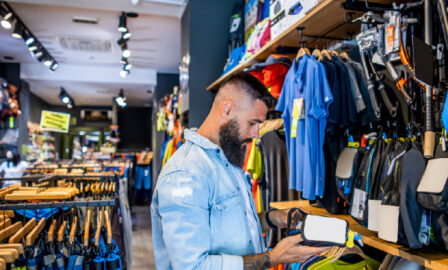Sustainability in Apparel and Footwear
Sustainability is top of mind for apparel and footwear brands that find their customers, employees, partners, and investors prioritizing sustainability-minded organizations. But implementing sustainable practices is complex, particularly for companies that manufacture overseas, distribute across multiple channels, or operate retail stores. It is complex, but possible, and the brands that successfully execute on sustainability transformations will push ahead of competitors in the market.
Sustainability in Retail
Several brands have paved the way for the sustainability movement in Retail. The United States Environmental Protection Agency (EPA) works with hundreds of corporations through their Green Power Partnership. This coalition features massive retailers like H&M, Target and Walmart, all committed to employing renewable energy. Within transportation, retailers such as Kohl’s and Nordstrom continue to improve their efficiency efforts with SmartWay High-Performance Shippers. Other retailers such as Nordstrom and Target have also pledged to reduce their carbon footprint and achieve zero carbon emissions through the Science-Based Targets Initiative. With copious retailers vowing to make a sustainable change inside and out, brands that hesitate will only fall further behind their competition.
Sustainable Footwear
Shoe Sustainability, a partner of the FDRA, found in 2020 that 40% of shoe companies have sustainability programs in place. Sustainability in footwear can manifest in materials, supply chain and even company culture. Some efficient tactics that shoe brands have enacted include eco-friendly and natural materials, recycled packaging, zero waste, and circular initiatives. As of 2020, a whopping 61% of shoe brands use recycled materials. Brands like Allbirds, TOMS, and Veja stand at the forefront of sustainable footwear. Allbirds, a San Francisco based company, utilizes natural and sustainable materials while focusing on transparency and limiting their carbon footprint. TOMS, an LA-based brand, expands its eco-friendly materials and processes, reduces waste and energy consumption, and provides consumers with green packaging. Veja, a French company, also prioritizes sustainable sourcing, manufacturing and consumption. Putting eco-friendly and ethical practices into motion is critical for footwear brands, as 64% of consumers are willing to pay more for sustainable shoes if marketed correctly.
Putting Sustainable Practices into Action
Worldwide apparel and footwear industries combined account for 8% of total greenhouse gas emissions. Jump-starting a sustainability initiative can be broken down into three steps:
Step 1: Make sustainability part of your brand’s core.
True sustainability seeps into a brand’s culture and values, seen within all levels of the company structure. Sustainable practices can be seen through product sourcing, environmental impact, and overall efficiency. For a sustainability strategy to be effective, it must have alignment from the C-level and permeate throughout the organization. An exercise such as Clarkston’s EDM framework helps executives create a cohesive and actionable plan for sustainability.
Step 2: Identify the big-win sustainability areas.
Apparel and footwear brands are unique, so a one-size-fits-all sustainability plan won’t cut it. An important aspect of a sustainability plan is the materiality assessment, to identify what components of the company’s operations are most significant internally and externally. This ensures that resources are allocated to sustainability initiatives that will have the biggest impact.
Step 3: Communicate with all stakeholders about your brand’s sustainable practices.
It comes down to tracking your operations at all levels. From production to supply chain, consumers are looking for the substance behind companies’ claims. An annual CSR report allows all stakeholders – customers, suppliers, and investors – to follow a brand’s sustainability journey.
If you are looking to expand your Apparel or Footwear brand’s sustainability efforts, reach out to our Retail experts. We can assist with all facets of sustainability, from strategy to execution across your organization.
Subscribe to Clarkston's Insights
Contributions by Rachel Ruth



